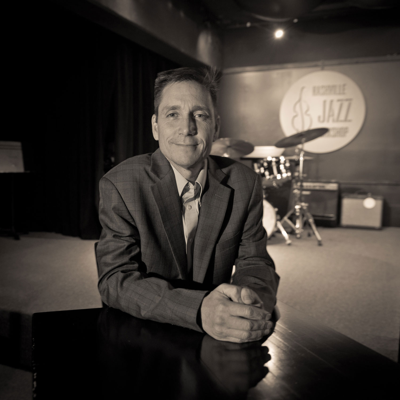
Eric Dilts
Pianist Lori Mechem and bassist Roger Spencer had no lofty ambitions when they gathered a few students two decades ago at the Lafayette Street facility that was then known as the Nashville Jazz Institute. But as veteran musicians with a wealth of experience playing in all types of situations, they were completely unhappy with what they had seen in other institutions that took a traditional approach to jazz education. Their goal was to create an alternative model that equally emphasized formal training and performance experience, with students simultaneously learning from and playing with established musicians in multiple settings.
The name was changed to the Nashville Jazz Workshop in 2000, and the facility relocated to the Neuhoff Complex in East Germantown while also becoming incorporated as a 501(c)(3) nonprofit organization. The NJW has grown tremendously since then, so much so that on July 9, Mechem and Spencer were able to do something that they’d wanted to do for years: They hired someone to take Spencer’s place as executive director.
“We’re finally going to get back to doing what we really want to do the most — play and teach,” Spencer says. He, Mechem and new executive director Eric Dilts spoke with the Scene one week prior to Dilts getting started.
“Things have progressed way beyond what we’ve ever dreamed,” says Mechem. “But we want to keep growing, and it was important for us to acknowledge we can’t do all the administrative things that need to be done and also focus as much on the music. So we felt now it was time to bring on someone who could deal with the administrative and financial development end.”
“I am thrilled to be part of writing the next chapter for the Nashville Jazz Workshop,” says Dilts, who left his job as a financial adviser and relocated from Illinois earlier this year. “It was like this job just spoke to me when I saw it advertised. I saw it listed online, and my family was already moving to Nashville because my wife was getting a new job there. At first I thought I would just see about getting transferred to the Nashville branch of Morgan Stanley. But I really wanted to get back into music, and this was just the ideal job.”
Dilts’ musical credentials include having studied and played percussion instruments from the age of 11 until 22, and participating in a drum clinic at Ohio State University taught by NJW faculty member Chester Thompson. Dilts also has a Bachelor of Music Business degree from Southern Illinois University, and though he’s been in Music City only a short time, he’s already put his financial experience to use in the Nashville music community. He is also a member of the Country Music Association, and this spring he coordinated a first-of-its-kind financial literacy seminar for CMA members. His vision for the NJW includes expanding its reputation and influence beyond the local community it already serves.
“My No. 1 goal in this job is to help the NJW’s long-term growth,” Dilts says. “I want to ensure its endurance. It’s already definitely a staple in this community, but we want to get even more people coming in. We want to make it the destination for jazz and live performance in this region, and also a place where people who love the art form can both come hear it and learn more about it.”
The NJW has earned glowing mentions in the educational supplements of both DownBeat and Jazz Times, and Spencer and Mechem cite many other positive changes. “Our board is bigger and stronger than ever,” Mechem says. “We’re now up to 14 members. We’ve strengthened the education component. In fact, that’s forced us to really get organized.”
One of the NJW’s biggest new offerings this year is a certificate program. It’s meant to supplement personal study or college-level programs, and students don’t end up with a degree or diploma. But they do get structured coursework taught by topflight instructors, many of whom have multiple decades of experience with nationally touring acts and faculty positions at local universities. Each of the three certificate tracks provides a different balance between improvisation studies, style studies and ensemble performance. There’s the literature track, made up exclusively of ensemble work; the performance track, which adds some improvisation and style to the mix; and the musicianship track, which surveys all three components roughly equally.
“We’re also really happy that we’re seeing a lot more diversity, both in terms of our students and also the people who attend the concerts,” says Spencer. “We’ve expanded our program, brought in some new things like our Great American Songbook courses and cabaret performances. The jam sessions are overflowing, and the Jazz on the Move series is still going, and we’ve now had some of those done at different locations. There’s also the Jazz Lunch series, our summer camp and youth camp programs, the Snaps on 2 & 4, and we’re getting started a pre-college program soon.”
Even with all of the planned growth, Mechem and Spencer are looking forward to flexing their muscles as professional musicians again. “I’m really ready to get back and start doing a lot more playing,” Mechem says. “And there’s going to be some new records coming, too.”
Spencer is the longtime bassist for the Beegie Adair trio, and he’s also excited about their forthcoming third engagement at Carnegie Hall. “They’re now calling it our annual appearance,” he adds with a note of pride.




